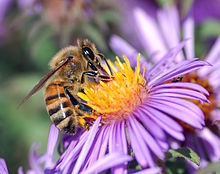Insecta
(Aa-enmyssit ass Shey-chassagh)
- She y rang Insecta bun-chooish y duillag shoh. My vel anaase ayd ayns ymmyd elley yn ennym beisteig, lhaih beisteig (reddaghey).
Ta beishteigyn, beisteigyn ny shey-chassee (dy ghra myr shen, olteyryn y phossan Insecta) nyn bossan smoo ny h-arthropodyn. T'ad jannoo magh possan dy vaaghyn smoo anchasley ny chruinney. Ta ny smoo na millioon dy ghooie oc er nyn soilshaghey - ny smoo nah lieh jeh ooilley ny organeyn bioag as fys orroo ain[2][3] - as t'ad credjal dy vel wheesh as 30 millioon elley ry-gheddyn foast, foddee. Myr shen, foddee beishteigyn jannoo magh ny smoo na 90% jeh organeyn bioag ny cruinney.[4] Ta beishteigyn ry-akin ayns bunnys dagh çhymbyllaght ny cruinney, ga nagh vel agh beggan ry-akin ayns y varrey, ream ny crustee.
| Beishteig (cadjin) Insecta (oaylleeagh) Rheam fossylagh: Devonagh leah[1] - jiu | ||||||||
|---|---|---|---|---|---|---|---|---|
 Shellan molley sheear (Oardagh Hymenoptera)
| ||||||||
| Rang oaylleeagh | ||||||||
|
Imraaghyn
reagh- ↑ Engel, Michael S.; David A. Grimaldi (2004). "New light shed on the oldest insect". Nature 427: 627–630. doi:.
- ↑ Chapman, A. D. (2006). Numbers of living species in Australia and the World (Baarle). Australian Biological Resources Study, 60. ISBN 978-0-642-56850-2.
- ↑ Threats to Global Biodiversity (Baarle).
- ↑ Erwin, Terry L. (1982). "Tropical forests: their richness in Coleoptera and other arthropod species". Coleopt. Bull. 36: 74–75.
| She bun ta'n art shoh. Cur rish, son foays y yannoo da Wikipedia. |